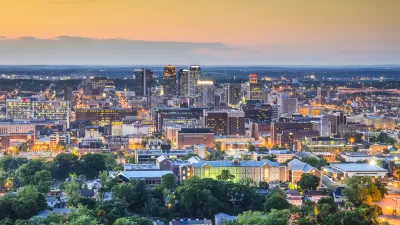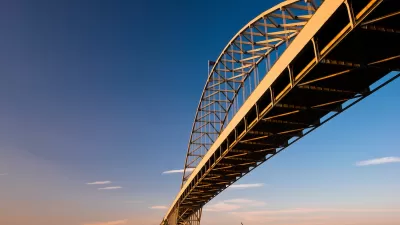Cities and states say the American Rescue Plan Act has been crucial to keeping the lights on during the pandemic, but some Republican lawmakers denounce spending on projects unrelated to COVID relief.

"A year after President Biden signed the $1.9 trillion American Rescue Plan Act into law, states and localities have used their $350 billion share of direct aid to provide Covid-19 vaccines, give workers on the frontlines of the pandemic extra pay, and to boost local economies." But as Kery Murakami reports, some lawmakers are questioning spending on projects that aren't pandemic-related. "For instance, states have earmarked the money to build monuments, create museums, tear down at least one abandoned university dormitory, and to carry out construction on courthouse buildings, according to a National Conference of State Legislatures database."
"This criticism has grown as more states report budget surpluses and as the GOP, during a midterm election year that will decide control of Congress, is seizing on the idea that the spending Democrats backed in the American Rescue Plan has contributed to a rising wave of inflation," writes Murakami. "The 152 cities and counties the National League of Cities, Brookings Metro and the National Association of Counties have been tracking have only decided what to do with 48.6% of their ARPA dollars."
Supporters of ARPA say it "has been instrumental in helping state and local governments weather the pandemic's economic fallout and for supporting their response to the health crisis" by replacing lost revenue and helping cities maintain essential services.
The source article details how states have spent ARPA funds so far and the rationales given for the projects.
FULL STORY: One Year Into ARPA Rollout, Spending Varies as Scrutiny Mounts

Planetizen Federal Action Tracker
A weekly monitor of how Trump’s orders and actions are impacting planners and planning in America.

Map: Where Senate Republicans Want to Sell Your Public Lands
For public land advocates, the Senate Republicans’ proposal to sell millions of acres of public land in the West is “the biggest fight of their careers.”

Restaurant Patios Were a Pandemic Win — Why Were They so Hard to Keep?
Social distancing requirements and changes in travel patterns prompted cities to pilot new uses for street and sidewalk space. Then it got complicated.

California Homeless Arrests, Citations Spike After Ruling
An investigation reveals that anti-homeless actions increased up to 500% after Grants Pass v. Johnson — even in cities claiming no policy change.

Albuquerque Route 66 Motels Become Affordable Housing
A $4 million city fund is incentivizing developers to breathe new life into derelict midcentury motels.

DC Area County Eliminates Bus Fares
Montgomery County joins a growing trend of making transit free.
Urban Design for Planners 1: Software Tools
This six-course series explores essential urban design concepts using open source software and equips planners with the tools they need to participate fully in the urban design process.
Planning for Universal Design
Learn the tools for implementing Universal Design in planning regulations.
Heyer Gruel & Associates PA
JM Goldson LLC
Custer County Colorado
City of Camden Redevelopment Agency
City of Astoria
Transportation Research & Education Center (TREC) at Portland State University
Camden Redevelopment Agency
City of Claremont
Municipality of Princeton (NJ)





























